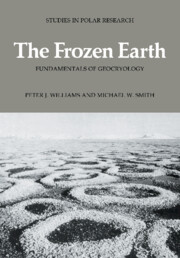Book contents
- Frontmatter
- Contents
- Symbols
- Preface
- Acknowledgements
- 1 PERIGLACIAL CONDITIONS
- 2 MORPHOLOGY OF PERMAFROST AND SEASONALLY FROZEN GROUND
- 3 CLIMATE AND FROZEN GROUND
- 4 THE GROUND THERMAL REGIME
- 5 THE FORMS OF THE GROUND SURFACE 1: SLOPES AND SUBSIDENCES
- 6 THE FORMS OF THE GROUND SURFACE 2: STRUCTURES AND MICROTOPOGRAPHY OF LEVEL GROUND
- 7 THERMODYNAMIC BEHAVIOUR OF FROZEN SOILS
- 8 HYDROLOGY OF FROZEN GROUND
- 9 THE MECHANICS OF FROZEN GROUND
- 10 GEOCRYOLOGY PAST AND FUTURE
- References
- Index
9 - THE MECHANICS OF FROZEN GROUND
Published online by Cambridge University Press: 24 October 2009
- Frontmatter
- Contents
- Symbols
- Preface
- Acknowledgements
- 1 PERIGLACIAL CONDITIONS
- 2 MORPHOLOGY OF PERMAFROST AND SEASONALLY FROZEN GROUND
- 3 CLIMATE AND FROZEN GROUND
- 4 THE GROUND THERMAL REGIME
- 5 THE FORMS OF THE GROUND SURFACE 1: SLOPES AND SUBSIDENCES
- 6 THE FORMS OF THE GROUND SURFACE 2: STRUCTURES AND MICROTOPOGRAPHY OF LEVEL GROUND
- 7 THERMODYNAMIC BEHAVIOUR OF FROZEN SOILS
- 8 HYDROLOGY OF FROZEN GROUND
- 9 THE MECHANICS OF FROZEN GROUND
- 10 GEOCRYOLOGY PAST AND FUTURE
- References
- Index
Summary
Introduction
As we begin this chapter, it is appropriate to consider first the physical features that make frozen ground a material of such challenging complexity. Without an appreciation of its special characteristics – including the peculiar properties of the ice – the mechanical properties of frozen ground will not be fully understood. This perspective finds much in common with the views of Tsytovich (1975), whose book is one of the major works on the subject.
Frozen soil is typically stronger than unfrozen soil or ice but it displays a time-dependent creep behaviour similar to ice. In addition to considerable time, temperature and strain rate dependent behaviour which is similar to ice, frozen soil displays frictional behaviour as in the unfrozen state. In contrast to unfrozen soil, however, its strength declines at high confining stresses after reaching a maximum (e.g. Chamberlain et al., 1972).
In simple terms, the strength of frozen ground can be considered as consisting of the cohesion of the ice matrix and the frictional resistance of the soil particles. The viscoplastic strength and deformation characteristics may be attributed largely to the presence of the ice matrix and cementation bonds. The frictional resistance may be considered as a residual strength component (see Sayles, 1973), that is a continuing resistance found after such bonds have been overcome and deformation has commenced.
- Type
- Chapter
- Information
- The Frozen EarthFundamentals of Geocryology, pp. 237 - 271Publisher: Cambridge University PressPrint publication year: 1989

